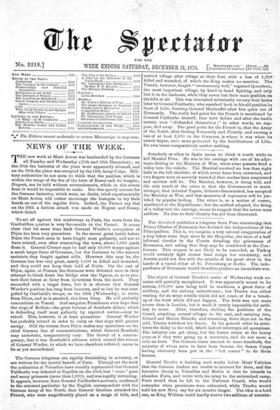To set off against this misfortune to Paris, the news
from the Garibaldian quarter is very favourable to the French. It seems -clear that for some time back General Werder's occupation of Dijon has been very precarious. In the recent great battle before Nuits the French seem to have fought most gallantly, and not to have retired, even after evacuating the town, above 1,000 yards from it. General Cremer says he had only 10,000 troops against much larger force of Germans, but the Germans in like manner /maintain they fought against odds. However this may be, the German loss was very great, nearly 1,000 in killed and wounded, and they could not keep their hold of Nuits. On the east of Dijon, again, at Pesmes, the Germans were defeated once in their attempt to break down the bridge over the Ognon, so as to pro- tect their forces at Gray from incursions from the south. They succeeded with a larger force, but it is obvious that General Werder's position has long been insecure, and at last he was com- pelled by Garibaldi7s troops, on the 28th (Wednesday), to retire from Dijon, and as is asserted, also from Gray. He will probably concentrate on Vesoul. And sanguine Frenchmen even hope that the siege of Belfort—the great fortress of Southern Alsace, which is defending itself most gallantly by repeated sorties—may be raised. This, however, is at least premature. General Werder has probably retired in order to carry on that siege with greater energy. Still the retreat from Dijon makes any operations on the .chief German line of communications, which General Bourbaki may undertake, comparatively easy. The theory of a contem- porary, that it was Bourbaki's advance which caused this retreat of General Werder, to which we have elsewhere referred, seems to be as yet unconfirmed.


































